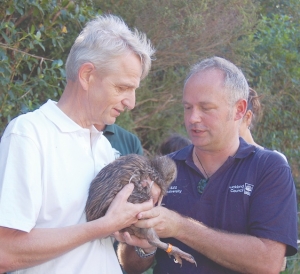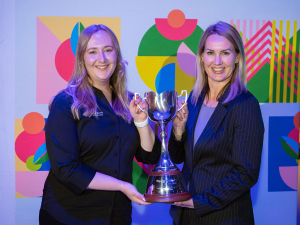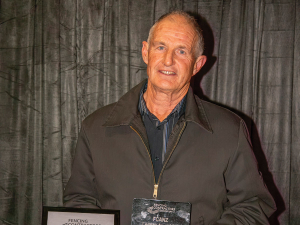Bayer New Zealand managing director Holger Detje says the global giant doesn’t see organic farming as a threat; it wants farmers to combine traditional chemical-based products with its new range of ‘biologics’.
“We offer farmers a more integrated solution in crop protection,” Detje this month told Rural News on Motutapu Island, where the company funded the release of rare Coromandel kiwis.
Detje says a key area of investment by Bayer is in biological products. Two years ago it paid US$425 million to buy AgraQuest, a US company supplying innovative biological pest management products based on natural microorganisms.
The first Bayer biologic product in the New Zealand market, Serenade Max, is a bio-fungicide/bactericide to aid in the control and suppression of powdery mildew and botrytis and sour rot in fruits and vegetables. Serenade Max has anti-fungal and anti-bacterial activity. Additionally it also stimulates natural plant defence mechanisms and has demonstrated increased plant growth effects. In this regard it has been used to manage PSA in kiwifruit previously.
Depending on the product label, biologic products can be used throughout a season and provide growers new solutions for residue-free produce.
With the New Zealand BioGro certification organic farmers can use Serenade Max and potentially other biologics, Detje says. “So that’s new for us and we want to participate in that sector.
“But I see the opportunity more for combining the traditional inputs we have in the crop protection industry with the biologic products – a more integrated solution.”
Detje says organics alone cannot meet the growing demand for food.
“We cannot feed nine billion people by 2050 by organic farming alone. This relatively small portion of the market is important and it is great that consumers have a choice.
“If consumers want to choose organic foods in a country like New Zealand, over conventionally grown food, that’s fine. And at Bayer we are able to provide inputs for good quality produce in all sectors.”
Bayer has “a rich innovation pipeline” supplying its crop protection business. This will help New Zealand farmers produce premium quality produce for the global market, Detje says.
“The world population is growing and global food demand is increasing and that’s a great opportunity for New Zealand – not just the dairy industry but other sectors, in particular horticulture.
“A few years ago we were talking about the global financial crisis… I think we are well over that: the wine industry is improving, the apple industry is recovering and there are positive signs in other industry sectors.
“So agriculture is doing well and will continue to do well long-term, and with that companies like Bayer, involved in providing solutions for higher yields and better quality food, are also benefitting.”

















